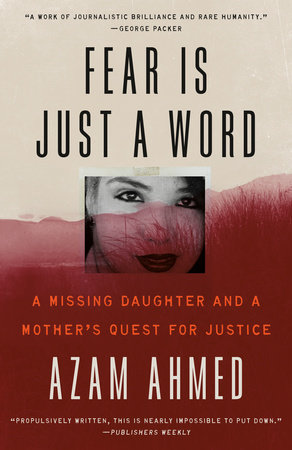A Lost Daughter
It was 4 a.m. on January 24, 2014, when Miriam’s phone rang and her daughter Azalea’s name popped up.
“What happened?” Miriam asked.
“Something awful.”
“With Ernesto?” Miriam asked.
“No,” Azalea answered, now sobbing. “With Karen.”
After hanging up with her daughter, Miriam had quickly packed and left a note for the family she was working for in McAllen, Texas. She told them she would not be coming back. By 6 a.m. on that day four years after the Zeta takeover of San Fernando, Miriam Rodríguez stood outside in the stark January winter waiting for the bus from Reynosa to San Fernando, a two-hour journey through the center of the state.
She had made her way to the international bridge in Reynosa, the same one she had carried Karen across more than twenty years earlier, when Karen was a toddler. On the bus to San Fernando, Miriam sat near the back and silently wept in the near dark. A few people tried to console her. She understood now that the sympathy of outsiders could never measure up to the chasm left by a kidnapped loved one.
An elderly man across the aisle handed her his handkerchief.
“Are you okay?” he asked. Miriam, normally guarded around strangers, told him her daughter had been kidnapped by the Zeta cartel.
The man nodded, pulled a scrap of paper from his pocket, scribbled something onto it, and handed it to her.
“That is the name and telephone number of my son,” he told her. “He’s a lieutenant in the marines.”
Miriam stuffed the number into her purse and forgot about it. Shortly after 8 a.m., the bus entered the municipality of San Fernando.
Hours earlier, Azalea, who was thirty-four and married, had been half asleep when she heard movement near her front door, the slow shuffle of feet across the patio tile and a low groan that she could recognize anywhere: her father. I.
A Lost Daughter
It was 4 a.m. on January 24, 2014, when Miriam’s phone rang and her daughter Azalea’s name popped up.
“What happened?” Miriam asked.
“Something awful.”
“With Ernesto?” Miriam asked.
“No,” Azalea answered, now sobbing. “With Karen.”
After hanging up with her daughter, Miriam had quickly packed and left a note for the family she was working for in McAllen, Texas. She told them she would not be coming back. By 6 a.m. on that day four years after the Zeta takeover of San Fernando, Miriam Rodríguez stood outside in the stark January winter waiting for the bus from Reynosa to San Fernando, a two-hour journey through the center of the state.
She had made her way to the international bridge in Reynosa, the same one she had carried Karen across more than twenty years earlier, when Karen was a toddler. On the bus to San Fernando, Miriam sat near the back and silently wept in the near dark. A few people tried to console her. She understood now that the sympathy of outsiders could never measure up to the chasm left by a kidnapped loved one.
An elderly man across the aisle handed her his handkerchief.
“Are you okay?” he asked. Miriam, normally guarded around strangers, told him her daughter had been kidnapped by the Zeta cartel.
The man nodded, pulled a scrap of paper from his pocket, scribbled something onto it, and handed it to her.
“That is the name and telephone number of my son,” he told her. “He’s a lieutenant in the marines.”
Miriam stuffed the number into her purse and forgot about it. Shortly after 8 a.m., the bus entered the municipality of San Fernando.
Hours earlier, Azalea, who was thirty-four and married, had been half asleep when she heard movement near her front door, the slow shuffle of feet across the patio tile and a low groan that she could recognize anywhere: her father.
After speaking with her sister at 3:30 p.m. the previous day, Azalea had not heard from Karen again. Azalea had asked her to join a church reading, but Karen had declined, saying she was eating a late meal with their cousin. Azalea tried her again around 8 p.m., hoping her sister might have had a change of heart, but Karen didn’t answer. Azalea had then asked her husband, Ernesto, whether he had seen Karen that day. Ernesto said that he had seen her at about 7 p.m., driving along San Fernando’s main street, La Calle Ancha. Azalea relaxed a bit; perhaps Karen’s phone had run out of power, or she had lost or broken it.
By 10 p.m., when Karen still had not responded to her messages, Azalea knew something was wrong and began calling her sister every fifteen minutes. She checked Facebook and messaged Karen there, then sent her a WhatsApp message: “Hey, charge your phone. I’m trying to call you.”
Having dozed off while waiting to hear back, Azalea was startled by the sound of her father approaching her front door. From the bedroom window, she could see his shadow stretch in the light of the front porch. They had not spoken in almost two years.
She padded down the stairs and opened the door before he could ring the bell. She hardly recognized him; he was disheveled and frightened.
“Karen,” she said.
He nodded.
As Luis stepped through the door, his phone rang. Azalea drew close to listen, sensing it had something to do with Karen.
“Don Luis,” the caller began, “by now you know we have your daughter.”
The caller relayed that after much discussion, his group had decided on a ransom of one million pesos, about $77,000, for Karen’s return.
Luis heard the rustling of wind, and then Karen was on the phone.
“Dad, they just want the money, it’s not about anything else,” she said.
Luis had not expected to hear her voice, and its sound disarmed him. Before he could respond, she continued.
“If you pay them, they will let me go,” Karen said. “If not, then I guess this is goodbye.”
Azalea felt that something in her sister’s voice suggested that she was less than sure her father would save her.
The kidnapper bade Luis good night and hung up.
Azalea and her father sat together on her sofa in silence. Eventually Azalea asked him how he would pull together that kind of money, which was more than they had, or could likely even borrow. He shook his head.
“They want it by 3 p.m. tomorrow,” he said.
It was nearly 3 a.m. by the time Azalea called Luis Héctor. He answered right away and asked what was wrong, a habit by then. He assumed the call had something to do with Ernesto, or perhaps their father’s health. He told her that he would come home right away, leaving Azalea to make the call she was dreading most, to her mother.
For Azalea, a dreamlike haze settled over the night, surreal and yet tactile and fully formed. Her father sat on the sofa, mute. Azalea wondered if they might wake up and realize that none of this—the kidnapping, the rapprochement with her father, the phone calls—had ever happened.
At some point they drove to Miriam’s house, where Karen had been living. On the way, her father told her he had already been to the house, after he got the first call from the kidnappers at midnight. Karen’s truck was gone and the house was locked, he told her, though the lights and television had been left on.
It was almost 6 a.m. when they pulled up again, and still dark outside. Azalea hoped they might find Karen sleeping inside, the subject of a virtual kidnapping, where the criminal only pretends to have the victim.
Azalea tried the front door, which was now unlocked. Inside, they found Karen’s purse on the living room table, its contents spilling out. The purse had not been there on Luis’s earlier visit.
“Someone must have come,” he said.
The home was in disarray, with electrical cords everywhere, papers on the floor, and the furniture flipped over. They both did and did not see the extent of the scene; they were focused on looking for Karen.
Azalea suggested they go and speak to the cousin who had been with Karen the prior evening, who lived across the street.
The cousin said that Karen had been eating with him when she got a call. Suddenly, she put her food down and told him that she was leaving, that she needed to give a friend a ride.
“What friend?” Azalea wondered.
“Ulises,” the cousin said.
Before Azalea could ask, the cousin said, “I don’t know who that is either.”
It was almost 8 a.m. when Luis went home to shower before heading to the bank to ask for a loan to pay Karen’s ransom. He wanted to be clean and well-dressed.
Azalea went to pick up her mother from the bus station.
On the bus, Miriam had yelled for the driver to pull over a few blocks before the San Fernando terminal; the station was under surveillance by the Zetas, and she wanted to arrive under the radar.
Copyright © 2023 by Azam Ahmed. All rights reserved. No part of this excerpt may be reproduced or reprinted without permission in writing from the publisher.







